Ayesha McGowan’s Bumpy, Joyous, History-Making Road to Cycling’s Big Leagues
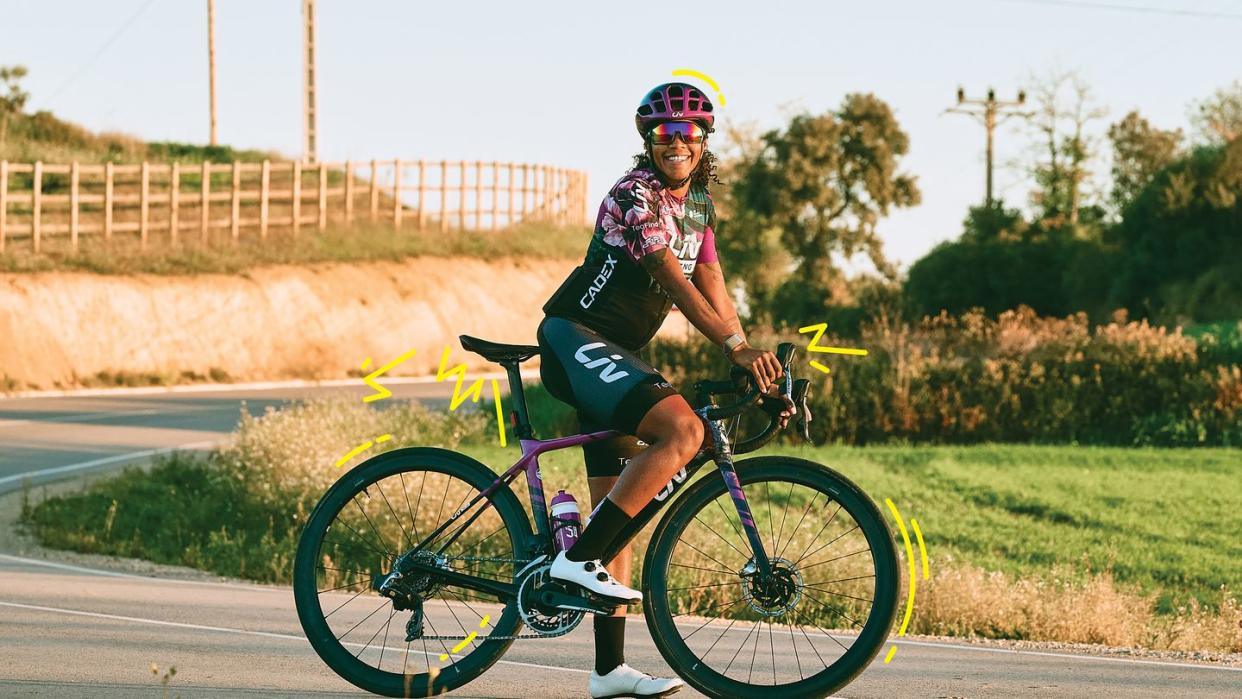
- Oops!Something went wrong.Please try again later.

usually go into things without knowing what I’m getting into,” Ayesha McGowan tells me as she dumps a pile of flour into a bowl without measuring it. “And I’m fine with that.” She is in her apartment kitchen in Spain, just outside Girona, attempting to make pancakes while converting imperial measurements to metric in her head. “Close enough,” she says, eyeballing the mound. “If it was my grandma, she wouldn’t do the math.”
It is fall 2022 and I have made the trek from California to Spain to spend time with a person who is one of the only African American professional women cyclists on the planet. Which is amazing when you consider that 12 years ago, she was a commuter who just liked riding her bike around and found that she was good at it. Working as a preschool teacher in the Bed-Stuy neighborhood of Brooklyn, New York, it began to occur to her that Black women were practically nonexistent in professional cycling.
Most people would have left it at that. That’s stupid. I hope that changes one day. Perhaps some of us might have followed an Instagram account, or donated to a Black-girls-on-bikes type program. But Ayesha McGowan is not like most people. She decided (“overnight”) to remedy the situation herself—and set out to become the first African American woman professional cyclist in modern history.
Join Bicycling for unlimited access to best-in-class storytelling, exhaustive gear reviews, and expert training advice that will make you a better cyclist.
This morning, the 5-foot-3 McGowan is lounging at the apartment she shares with her husband, William Loyd, wearing a cycling cap, a sleeveless tee that reads “representation matters,” and a pair of statement glasses of which she seems to have an endless supply (today’s feature square rims with a rainbow pattern). She exudes an easygoing confidence.
McGowan cites her grandmother, now in her late 80s, as a primary source for her remarkable self-assurance. “She thinks I’m the bee’s knees, and I love it. She didn’t finish high school; she got her GED, in the South, in Georgia,” she says with slight awe in her voice. “I remember watching her do that. And I don’t know, it’s just all the things I take for granted are things that probably were her wildest dreams.”
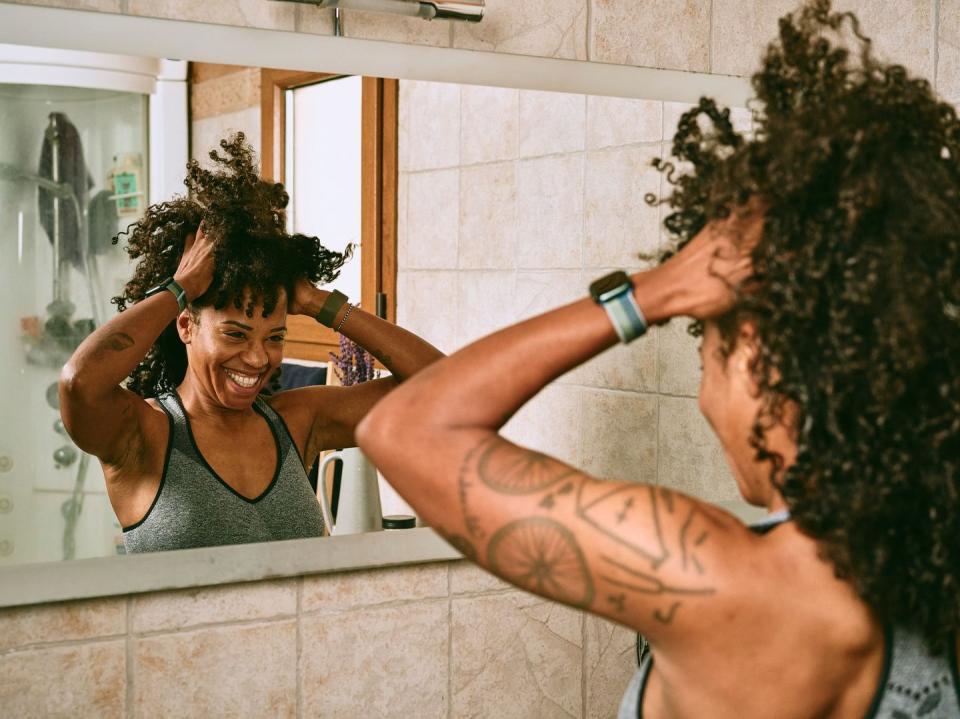
Much of what the 36-year-old has accomplished is beyond most people’s wildest dreams. She is an advocate for Black women in cycling, work that became a natural outgrowth of having to advocate for herself. She runs the blog A Quick Brown Fox, which she initially launched to chart her journey to pro status but has since become the nexus for a movement to help Black, Indigenous, and other people of color thrive in cycling and outdoor sports. She helped found The Black Foxes, an “international collective of unapologetically Black cyclists …. [with] a mission to welcome more Black people into outdoor spaces.” Through partnerships with companies like Zwift, Liv, Giant, and SRAM, she launched Thee Abundance Project, designed to create a pathway for women of color to go from beginner to professional road cycling by eliminating many of the barriers along the way. Programming includes beginner-friendly initiatives to encourage women to try bike racing for the first time via introductory camps and online workshops.
She is self-taught, self-motivated, and, judging by the way she makes pancakes, largely impervious to the self-doubt that would at the very least make other people second-guess their actions. All of which have combined to buoy her—improbably, amazingly, fantastically—to actually become the first African American woman professional cyclist in modern history. She currently rides for Women’s World Tour team Liv Racing TeqFind, and notched an astonishing seventh-place finish in Stage 6 of the 2021 Tour Cycliste Féminin International de l’Ardèche in France, her first professional stage race in Europe.
Ayesha McGowan is nothing if not resilient. But in 2021, as she was building up for some of her first races in the European peloton, medical issues she had been quietly battling for years finally became impossible to ignore.
Sometimes you achieve your dream, and it doesn’t look anything like what you thought it would.
The window in McGowan’s third-floor kitchen looks out on green fields and an endless autumn sky that seems filled with possibility. Puffy clouds look painted on the azure blue. It feels fortuitous that McGowan is making pancakes. I love them. So much so, that I have a slightly off-the-wall theory about how to make them. See, I believe that the recipe matters only a little. The real secret is that they can sense your spirit. If you make them with good intentions and a pure heart, they will be delicious. I share this with her over the breakfast table and it elicits a musical laugh. It is then I know her pancakes will most likely come out perfect.
McGowan’s first love was music. Raised in Piscataway, New Jersey, she was playing piano by age 6 and violin by 8. In middle school she added guitar to her repertoire and played in her church youth group, an activity she enjoyed—as long as she didn’t have to wear a dress. In an early example of the perseverance that would later become a defining quality of her career, she remembers staying in the car an entire Sunday morning because she refused to be seen in a dress. “I was a very stubborn kid,” she says, laughing. “I always called you on your bluff. I think it was one of those, ‘Well then you can just stay in the car!’ And I was like, ‘Excellent. I’m glad we could come to an agreement.’”
After high school, she enrolled in the music program at New Jersey’s Rutgers University, but eventually sent a dorm-room audition CD to Berklee College of Music in Boston. “By some miracle of God, I got in,” she says, flipping a pancake. (I’m thinking the miracle was that she was probably very good.)
At Berklee she ran out of money with a handful of classes to go, and finished the last few credits at a community college. It was in Boston that she began using bikes to commute. Unimpressed with the city’s public transportation system, she seized possession of a steel-framed Schwinn languishing in her mother’s garage, which served her needs until she left it outside one winter and gained a healthy dose what her grandfather called “store-bought sense.”
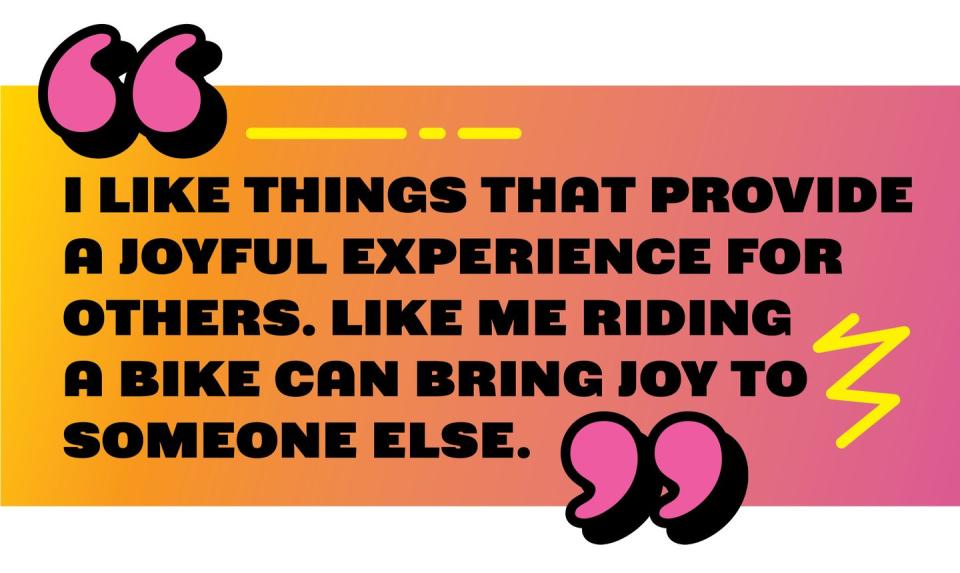
Her replacement was a steel Raleigh frame that she converted into a fixed-gear bicycle on the advice of a boyfriend. This move would prove to be a mixed blessing. The day after she converted the bike, she tried to clean her newly adapted drivetrain and severed her finger between the chain and the teeth of the cog. “So now I have a shortened fingertip,” she says, gleefully showing me her hand.
She had no dreams yet of riding professionally, and already had sacrificed a body part to the bicycle gods. But she was undeterred. “It’s not the bike’s fault,” she explains. Besides, she was hooked on riding fixed. “You always get out what you put in,” she says. “It’s like instant feedback.”
Ayesha McGowan speaks with a kind of easy calmness that may seem at odds with her strength and intensity. She is quick to smile and has an effortless laugh that often bursts out mid-sentence, particularly when she’s talking about things that are weird and ridiculous, like times she gets lost while riding. (“I’m always lost,” she says.) It almost feels a shame not to laugh with her. Underneath that lies a measured thoughtfulness that makes it clear that even as she chats with you, her brain is moving quickly, making connections, processing things you may not yet be aware of. One gets the sense that she could have done literally anything she set out to do in the world, provided it presented a big enough challenge.
As soon as she was done with school in 2010, she left Boston and moved to Brooklyn. There, she worked for several years at a small, family-run preschool where she got to flex her creativity and take charge of her own projects. “I enjoy solving things, making systems better,” she says, her face cracking into a wide smile. She wrote and directed full-scale musicals for the kids—sewing costumes, buying red curtains at IKEA, arranging a version of MC Hammer’s “U Can’t Touch This” to be sung by the Big Bad Wolf in an adaptation of Little Red Riding Hood. “I’m sure there were copyright laws I was in violation of at that point,” she laughs.
She had that job for about five years and was still commuting around the city on a bike. I ask her if she had a plan that one day, she would do something different. “I don’t know if I’ve ever had a plan,” she admits. “I particularly like things that can provide a joyful experience for other people. Music does that. Bikes do that in a weird way. Like me riding a bike can bring joy to someone else.”
While living and working in Brooklyn, she learned that many of her students had never left the borough. It made her appreciate the power of bikes in a new way: “Anything that can expand your range of mobility comes with a sense of freedom.”
To that end, she took part in a program for disabled people to ride on the back of tandem bikes powered by volunteers. She attributes much of her early strength to those efforts: “I was doing multiple laps up the hill in Central Park...on a heavy bike with a person that was bigger than me.”
It was during this period that it started to occur to her that there were no women African American pro cyclists. She would ask around, search the internet. “I mean, I was looking, and when I discovered that there hadn’t been, I don’t even know if there had been a Black woman at that level, but an African American woman or Black woman, whatever. It’s just like, that’s stupid.”
For years, if a Black woman was to set a course for herself as a pro cyclist, it meant blazing a trail all her own. She would not be able to draft behind others, or benefit from paths already paved. She would have to face the winds head-on. That reality is what McGowan is working so hard to change.
A 2021 report by the League of American Bicyclists noted that in a household study from 2009 to 2017, the percentage of commuter bike trips taken by Black cyclists shrank from 11 percent to 6 percent, and that Black people make up a significantly smaller percentage of bike commuters than they do of the workforce. East of the Mississippi River, where the difference was most extreme, Black people made up 37.7 percent of the workforce but only 15.9 percent of bicycle commuters. The idea persists that cycling is overwhelmingly white in both practice and culture.

Representation isn’t the only challenge in the movement to make cycling more accessible. There is also a long history of infrastructure disparity. A 2023 report from the advocacy group BikeLA revealed that Los Angeles County neighborhoods with the highest percentage of people of color had a lower distribution of bicycling facilities (e.g., bike lanes, repair shops, signage). Areas with the lowest median income were also the areas with the highest number of bicycle and pedestrian crashes. This suggests that for people of color to feel interested, motivated, and safe around cycling in greater numbers, we need infrastructure access to the things that support cycling—and we need role models.
It is no secret that cycling has historically not made space for women at all, let alone Black women. When the sport first became popular in the United States in the late 1800s, its earliest clubs, like the League of American Wheelmen, banned the participation of both women and Black people. In some cases, men were fined or suspended for even participating in races with women.
A Black seamstress named Kittie Knox, born in Boston in 1874, is generally remembered as the first African American woman to be accepted into the League of American Wheelmen, at the time one of the premier bicycling clubs. (It still exists, operating under the banner The League of American Bicyclists.) She joined in 1893, one year before members voted, largely in response to her presence, to prohibit non-white membership—a resolution that wasn’t formally repealed until 1999. Knox fought for her place on the grounds that she preceded the ban. Her acceptance was ultimately granted. She continued to race and ride recreationally, even though she encountered resistance along the way.
Some 35 years later, in 1928, five Black women cyclists rode 250 miles from New York City to Washington, D.C. An article in the New York Age, a prominent African American newspaper of the time, reported that they were solely motivated by the love of the great outdoors. An annual ride re-creating the journey and led by Keshia Roberson, founder of Major Knox Adventures (a company that leads bicycle and outdoor trips for under-represented communities), began in 2021.
A search for the history of Black women cyclists in the years since that historic ride yields few results. This is an obvious irony, given that recreational and commuter cycling has been and is undoubtedly practiced by people of all races, genders, and economic strata. It forces one to ask a rather obvious question. Why don’t we hear more about Black women cyclists?
McGowan began blogging about her journey in 2014 at A Quick Brown Fox largely to keep herself accountable. Her first competitive race was the Red Hook Crit in Brooklyn on a rainy night in late March of that year. She had gotten word that Randy Locklair (who ran a timing-system company, Hatchmap, and who would become a longtime partner of hers) was looking for riders to field a women’s team for the race. McGowan reached out and landed her first team sponsorship. “It ended up just being me and one other woman,” she recalls.
She learned quickly that becoming pro wasn’t as easy as talking her way onto a team. “When they took off, it was like…was I moving backwards?” She was shocked by the quickness and decisiveness of the other riders and found herself immediately lapped. “I was strong enough to stay with the lead group,” she now reflects, “but I wasn’t brave enough.”
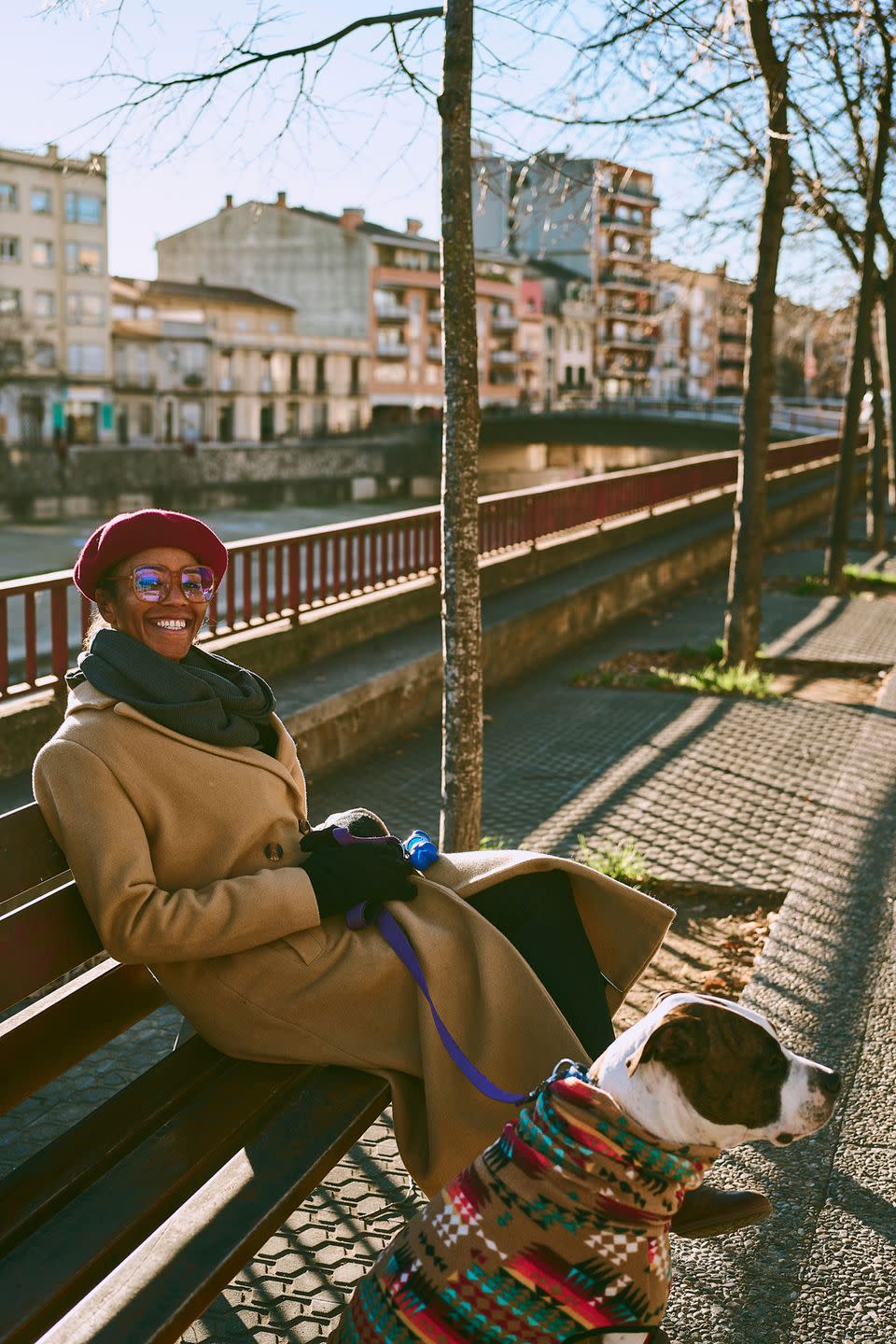
Riders overtaking her had to swerve to avoid her, and that, combined with the wet conditions, led to a severe crash, something she still cringes over. “It wasn’t my fault. But it was my fault…I was supposed to get pulled by the officials or moved to one side or something.”
Devastated, she was removed from the course in tears. After she apologized to the other riders, including one who was badly injured, McGowan quickly signed up for every training opportunity she could. That included sessions at the Kissena Velodrome in Queens and a road racing clinic with the Century Road Club Association in Central Park, which she learned upon arrival was actually a race. “It was like five in the morning and there was a woodpecker, just going at it,” she laughs. In that race, McGowan weirdly found herself in the lead toward the end and decided to break away. “I was like, ‘Oh, nobody else wants this?’” But the finish was farther out than she had remembered, and she was caught a few blocks from the line. Still, her efforts earned her fifth place. She knew she had done just one thing wrong, but the podium was within reach. From that moment she was hooked
On the encouragement of Harlem cycling legend Bill Montgomery, McGowan made the trip up to White Plains, just north of NYC, that June to race in the 2014 New York State Crit Championships. At first, she was skeptical. “I was like, ‘Dude, I literally have done two races. I don’t think that’s a great idea.’ He’s like, ‘It’s fine, you are going to be great. And if you win, you get a shirt, you get a jersey.’ And I was like, ‘Well, that sounds cool.’” His only advice: Just make sure to be first, second, or third out of the corner and let the rest work itself out.
McGowan heard the message and finished third overall, but first in her category. “I was like… heck yeah,” she recalls, in a typical McGowan understatement.
For the next few years, she competed in races all over the U.S., supporting herself with her preschool job and cobbling together sponsorships for bikes and equipment. As she gradually earned points toward category upgrades, she was often just winging it, acting as her own coach, chef, mechanic, soigneur, and strategist. (Her husband, she says, was often the chauffeur.) Nevertheless, she was putting together solid seasons with strong showings in crits and road races.
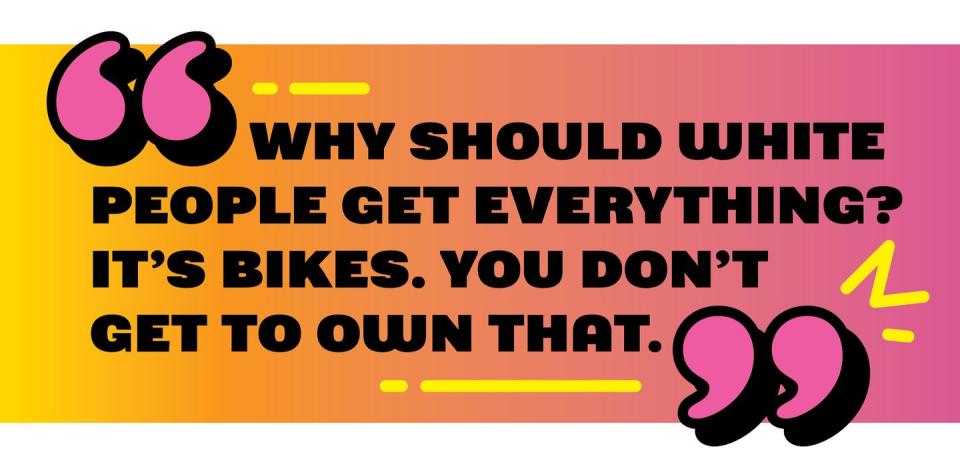
In 2017 she was in talks to join a major domestic team, but that fell through at the last minute. (She learned she was not on the team after seeing the new members announced on Instagram.) It was already November, late in the game, and she and William had just moved to Georgia to be closer to family. She quickly found another team, signed a contract, and felt, for a moment, relieved. The next day they told her they were going in a different direction and fired everyone.
“They found a star player they really liked, and that person got to pick…” she says, her voice trailing off. “That was kind of like too many hits. We had just moved, and when I tell you we had no money—we had no money, we had no furniture, we had no jobs. We had no nothing. It was just too many things at once.”
McGowan struggled to find a day job that would pay enough to justify the time away from training, not to mention the daily battle with the infamous Atlanta traffic. She was determined to make sure none of their meager household money went toward her work as a cyclist, and she strung together enough equipment sponsors to keep racing.
In 2018, she rode her first gravel race, the Unbound 200. She had trouble keeping food down before the race, which, at the time, she wrote off as nerves and gastrointestinal idiosyncrasies. Fueled only by a carton of Muscle Milk, she set out to tackle the infamous gravel roads that traverse the Flint Hills of Kansas. Other than dropping a chain, the first hundred miles were relatively uneventful (“I can fudge a hundred miles,” she laughs). But she began to get bored. And delirious. The podcasts and Beyoncé playlists weren’t enough to keep her going. She saw a few male riders resting on the ground near some bushes and joined them until she could catch her bearings. When they quit the race and hopped in a car, she decided that she had to finish. “I couldn’t not finish,” she says. “I rode 200 miles of gravel in a day—which never again, unless there’s a zombie apocalypse and I need to for survival.”
Several days after our kitchen hangout, we are once more eating pancakes, this time seated outside a quaint café in Old Town Girona. McGowan has just come from a training ride, and even though she has spent three hours on a bike, she appears as relaxed and chipper as someone who just came from a dinner party. Girona is home base for many pro racers, and the town is full of spandex kits and five-figure bikes. When she rides here, McGowan says it is not uncommon for a random male cyclist to try to outpace her and other women she’s training with. During today’s ride with Teniel Campbell, currently with UCI Women’s World Tour Team Jayco AlUla, a guy dropped his female riding partner just to show he could best the two pros. “I rode him next to Teniel, and she just put on the gas and he couldn’t hang,” she says. “It’s like: ‘Don’t do that.’”

The purpley floral pattern on the shoulder of her team jersey glows in the late morning sunlight as we enjoy our pancakes and coffee. She began riding domestically with Liv Racing in 2020. In August of 2021, she joined the Liv World Tour team as a trainee. She says she was attracted to the brand’s willingness to support her community-building vision. “The seed idea for what became Thee Abundance Project, I had brought it to another team, and they were like ‘Great. We’ll put you in touch with our charity department,’ and it was nothing. Crickets. It’s almost like people don’t believe.”
Liv did believe. And they were willing to give her the resources and support to make her vision a reality. “I find that most companies, especially in the bike industry, are not equipped to do the kind of things I want to do. They have so many other things higher on the priority list. So it’s just like, give me the money. I’ll figure it out. That does not need to be you. You’ve got money. I’ve got ideas.”
That clarity about how to work together also helped her find support for
A Quick Brown Fox in its early stages. After moving in 2015 to California for William’s job, she had two seasons of racing, a couple of trophies, and some momentum under her belt, but she wanted to do something bigger. She reached out to Randy Locklair at Hatchmap once again with a proposal.
“One thing you should never say to me is, ‘Let me know if you need anything,’” she jokes. “Because I will let you know.”
McGowan’s plan was to travel around that summer and race criteriums, under the A Quick Brown Fox banner, and she wanted him to sponsor it. She wasn’t even a Cat 2 yet, but she was confident she’d get there in time for the season to start. Locklair liked her proposal and agreed to fund her. He also paid for the kit design and photography, helping McGowan solidify a brand. Furthermore, he helped her secure other equipment sponsorship. This was an important step that helped get AQBF from its earlier iteration—a blog for McGowan to share her thoughts and experiences with the world—to what it is today, ground zero for a movement to enable women of color, and particularly Black women, to enter and enjoy cycling at all levels.
Along the way, she filled the blog with race reports, guest posts from other cyclists, interviews with Black women bike mechanics, advice for how to take a bathroom break while wearing bib shorts, strategy tips for road racing, rants about irritating commenters, and general upliftment. More recently, a post advocated against the UCI policy change that effectively bans transgender women. Another shared successes from Thee Abundance Project, including the story of Rachel Parker, who is now a Cat 2 and racing domestically in the U.S.
I ask her if she feels the pressure that many Black people do in white-dominated fields, the feeling that you have to do twice as well to be considered half as good. She tells me that she doesn’t put that pressure on herself regarding race results. In terms of her work outside racing? “I have to work in all these different arenas to stay relevant. I understand acutely my value is not just my athletic ability, it’s also how I make these companies look good.”
This is a complex space in which to operate and one that Black “pioneers” almost always find themselves having to navigate. Are people actually interested in you, or are they interested in using you for diversity clout? And how much should you care about that if it means you can open doors for other people?
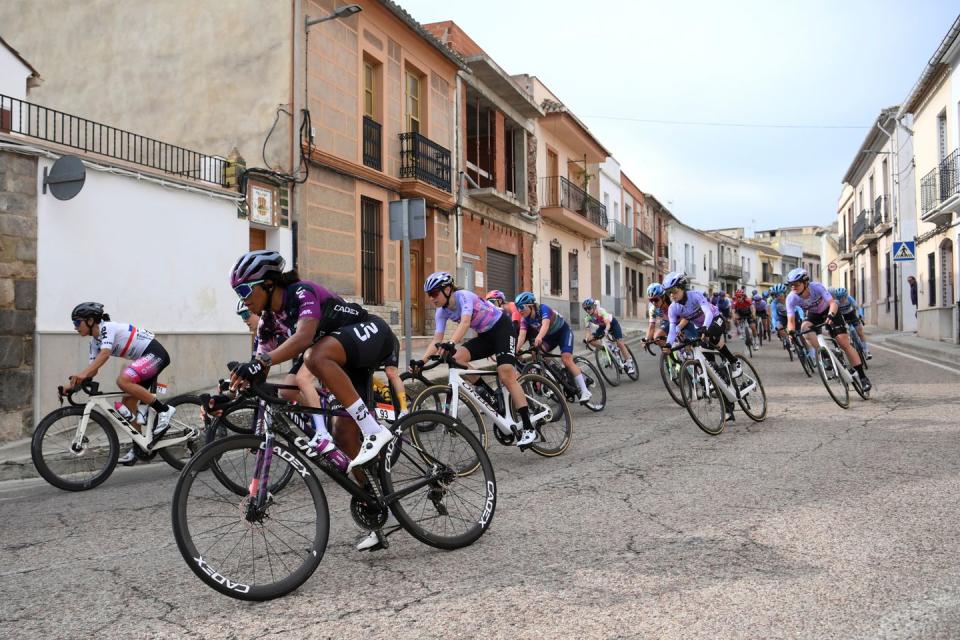
For McGowan, the attention that comes from being “the first Black woman” is double-edged at best. “We’re in this era of people using diversity as a means of extreme capitalism and making money off of looking like you’re doing something for other people, and it makes me so mad…because they’re not actually doing it at all!”
And sometimes she wonders if what she’s doing really matters. “I don’t think I’m helping people,” she says. “I don’t think that people riding bikes professionally is helping anybody. Some people have social missions like, ‘Let’s get little Black kids out the hood.’ Yes. Do that. Sure. But that’s not what I’m trying to do. It’s more [that] I feel like everything is terrible, and the world is a shitty place. I’m driven by the idea that you need to find joy. You need happiness to keep going. I wish everybody could do things that make them happy. I get a lot of joy from seeing other people fulfill their potential from whatever.”
Here she pauses for a bit.
“But I also get a lot of joy from proving people wrong, because I’m stubborn.”
When she says this, I understand something fundamental about her. Beneath her easy smile, charming nerd jokes, and quick and generous laugh lies a very solid core of obstinance. To be honest, it’s impressive.
“Also,” she continues, “why should white people get everything?” Here the smile fades a bit. “It’s bikes. You don’t get to own that.”
By the time Ayesha McGowan signed her first pro contract, she had spent so many years overcoming odds and challenges, pushing herself uphill, that she didn’t even recognize the hills anymore. Throughout her career, she’d had trouble with eating and digestion. She had learned to compensate by adjusting her diet, but her symptoms intensified over time. Despite a high pain tolerance and an ability to gut her way through almost anything, she found herself lost in a maze of frustrating medical appointments and confusing test results several months before she was set to do some fall races in Europe in 2021.
One gastroenterologist suspected uterine fibroids and ordered an ultrasound. The scan was inconclusive. A gynecologist said it was almost definitely a fibroid and the options to remove it were laparoscopy or a hysterectomy—but she didn’t need to decide right away.
The main takeaway? She didn’t plan to have kids, so her case was less urgent, an idea that still bothers her. “It was like: ‘Oh, this is not a big deal,’” McGowan says. “‘It’s not a problem because you’re not trying to fix your body to be a baby factory.’”
She was set to leave for Europe in a matter of weeks when another doctor recommended an upper endoscopy to figure out what was going on with her digestion. But she couldn’t get an appointment for at least two months. So she went to a different medical office with earlier availability. The physician there told her with great confidence that a fibroid could not be the cause of her problems unless it was impossibly huge.
He recommended a gluten-intolerance test, which came back negative, and suggested she drink Metamucil and come back if that didn’t work. Lacking the money to pay another $100 deductible for a virtual call with a man who doubted her, she once again took matters into her own hands, figuring out her own system of foods to avoid. It was good enough that she managed a summer of crits in the U.S. and some fall races in Europe, though sometimes with great difficulty and often while barely eating.
The turning point came when she stayed a week with a Liv team director, Giorgia Bronzini, between races. “Watching her watch me was eye-opening because it was just the two of us for several days. I could see in her face that she was like: ‘This doesn’t make any sense,’” recalls McGowan. “After the last race I did, my teammate Marta Jaskulska said something about how as an athlete, your body must be working perfectly. That was a lightbulb moment. It seems obvious, but I was like, ‘I have never had that experience. My body has never worked perfectly.’ And I was like, ‘I need to figure this out.’”
In 2022, she sought medical treatment in Spain and found herself with an immediate, conclusive diagnosis of fibroids. They were large enough that they were pressing on her intestinal tract and impeding her digestion. She recalls that the Spanish physician was exasperated with her, believing that the only way it could have gotten this bad was if she had ignored her doctors. She found it difficult to explain how hard it had been to get her doctors to listen. “It’s a cautionary tale of the American medical system,” she says.
Her story is alarming—and not unique. By age 50 nearly two thirds of all women experience uterine fibroids, and for reasons that are not yet clear, the condition seems to disproportionately impact women of color. Black women are diagnosed at nearly three times the rate of white women and are two to three times more likely to have recurring fibroids. This dovetails with other medical trends specific to Black patients. A 2019 Department of Health and Human Services report found that Black people receive worse care on 40 percent of the department’s care quality measures. And a year later, a University of Virginia study of medical care among NCAA athletes found that physicians were less likely to believe Black players’ reports of pain, even if those same physicians had generally positive racial attitudes. All this means that Black women are both more likely to experience medical challenges from fibroids and less likely to be believed or treated well by medical professionals.
“Black women have such a hard time being heard in healthcare,” McGowan says. “It just made me feel discarded.”
It took her weeks to get the medical care in Spain that she could not get for more than a year in the U.S.; she had an ultrasound on demand and went under the knife within a couple months of being diagnosed. The surgeon removed a total of 12 fibroids, and the scar was bigger than the scar would have been for a Cesarean section. She sent me a photo from before the surgery—her belly looked like she was at least in the second trimester of a pregnancy.
Now she sits after a three-hour ride happily munching on pancakes in the sun, feeling excited about what it would mean to race without fibroids so large you can see them through her skinsuit. She tells me that she finally set personal records for a workout for the first time since January.
“This workout is not supposed to be hard, but it felt impossible,” she says. “These past two days in a row, it didn’t feel impossible at all. It felt super comfortable. I was really confident, and it was the best I’d done in this year.”
During the race season, she rides anywhere from 1.5 to 4.5 hours a day and receives coaching from Carmichael Training Systems, based in Colorado. The coaching, she says, offers a vital outside perspective for someone who is accustomed to pushing herself. “It takes away the anxiety of knowing I’m doing the right thing,” she says. “It’s a person to tell me when to sit down and when not to sit down. Perfectionism is hard to fight, but there is no perfect way to do things.”
She has learned to prioritize sanity and joy above all else. “I feel I’m more likely [to perform well] if I’m healthy and happy than if I am raggedy and worn out. I mean, sports are unforgiving. Anything can happen and it’ll just ruin it all for you. People are in peak condition, and they get injured and then it’s all for what?”
As for her cycling future, now that she’s healthy and living the reality of what she set out to achieve, McGowan is clear:
“The goal was I want to be a pro,” she says. “And it’s like, well, I did that. Everything else is gravy.” Sure, she has stretch goals: “I’d like to go to the 2024 Olympics and I would like to do 2025 UCI World Championships in Rwanda. But right now I’m just trying to be a healthy person,” she says.
She is looking forward to a more robust racing schedule with a body and brain that are operating at full strength. “I’m just excited people want to race bikes,” she says. “Like that was the whole point. I’m pretty good, but I feel like the others that will come after me are going to be so much better. And I’m going to enjoy the shit out of watching it.”
In the meantime, “I’m focused on being a useful asset to my team to help other people win,” she says. “Maybe one day I’ll also get my chance.”
As usual, she has something to prove.
“Racing in Belgium kicked my ass this year,” she says, “and I’m not finna let that happen again.”
I believe her. Don’t you?
You Might Also Like

